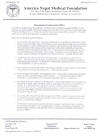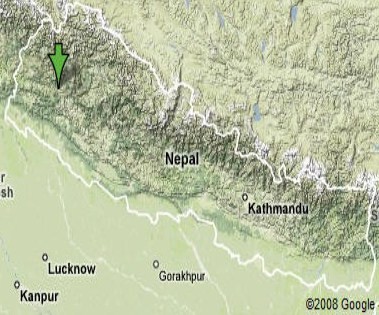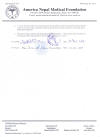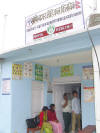Project Description
Project ID
06NH001
Project Type
Funded Project - Development Project
Project Title
Project Summary
The Doti and Achham districts of far western Nepal are currently lacking basic health services. With only one physician for the districts' 450,000 residents, maternal and child health outcomes in particular are some of the worst in the world. This proposal describes the development of sustainable healthcare delivery infrastructure and training for Nepalese community healthcare workers in the area of maternal and child health. It is part of a larger initiative between university-based healthcare providers in the U.S. and their Nepalese counterparts (see Nyaya Health), in an effort to improve health outcomes in western Nepal.
This fourteen minute video describes Nyaya's project in Achham.
Location
Time Frame
April 2007-April 2010
Institution
Nyaya Health
Yale University School of Medicine
Contact
Nyaya Health
c/o Duncan Smith-Rohrberg
135 College Street, Suite 323
New Haven, CT 06510 USA
Telephone: 203 687 8615
Fax: 630 604 8615
email: duncan.smith-rohrberg![]() yale.edu
yale.edu
ANMF/Nepal Project Manager
Dr. Prativa Pandey
PrativaPandey![]() anmf.net
anmf.net
ANMF/America Project Manager
Bob Gerzoff
BobGerzoff![]() anmf.net
anmf.net
Richard Katzmann, MD
RichardKatzmann![]() anmf.net
anmf.net
Project Description
In the western districts of Achham and Doti, maternal and child care services are almost totally unavailable. Only 3% of pregnancies are attended by a trained healthcare worker, and nearly 1 in 100 pregnancies result in the mother's death. Infant mortality rates are near 90 per 1000 live births, and childhood malnutrition rates are approximately 60%; 69% of children aged 6-36 months exhibit stunted growth while 18% show severe wasting. These rates are three times those observed in Kathmandu and over twenty times those observed in wealthy nations. Over 80% of the population in Achham and Doti has no access to sanitation, resulting in high rates of diarrheal disease, and 60-65% of children have chronic intestinal helminthic infections. Despite these alarming data, infrastructure for the delivery of maternal and child healthcare is nonexistent, with the single government clinic being largely non-operational.
Our strategy for improving maternal and child health services in the districts of Achham and Doti is based on two core principles: 1) that the delivery of appropriate care to this area will rely upon building new medical infrastructure; and 2) that the delivery of medical services can best be made self-sustaining by incorporating the instruction and training of Nepali medical personnel into the development of this infrastructure. In the description that follows, we divide our proposal into maternal and pediatric components.
To best serve the region, we are obtaining from the Nepali government a long-abandoned set of hospital buildings at a crossroads well-situated to serve as a district hospital for Achham and Doti. The provision of clinical services at this hospital will involve four major components: basic prenatal and routine delivery services; emergency obstetrical services; routine gynecological services including preventative care; and the management of common outpatient pediatric conditions.
Each of these components will be integrated with a training the trainers program a hands-on medical education program to train a set of core Nepali healthcare workers in up-to-date quality medical service delivery practices, combined with institutional support and materials to allow these core healthcare workers to train other Nepali healthcare workers as the hospital site expands. We have found that this model has worked best in our other project, an infectious disease training and treatment program in Kathmandu, which has been selected as a model program by the United Nations Development Program (UNDP).
The training will be conducted by healthcare workers currently at the Yale University School of Medicine and the University of Pennsylvania School of Medicine who have experience and/or cultural backgrounds in Nepal and have extensive work experience in this realm. This group is advised by the project directors, who are:
Paul Farmer, M.D., Ph.D., Professor, Harvard Medical School
Gerald Friedland, M.D., Professor, Yale University School of Medicine
Caroline Jacoby, Ph.D., Program Officer, Johns Hopkins School of Public Health
Fernet Leandre, M.D., Project Director, Clinique Bon Saveur
Sheldon Campbell, M.D., Ph.D., Assistant Professor, Yale University School of Medicine
Michael Rich M.D., M.P.H., Professor, Harvard School of Public Health
Alfred Sommer, M.D., M.H.S., Dean Emeritus, Johns Hopkins School of Public Health
Tokugha Yepthomi, M.D., Physician, Y.R.G. Center for AIDS Research and Education
We are seeking only one year s worth of funding at this time from ANMF; as a young organization, we would like to demonstrate tangible outcomes prior to further funding. Should ANMF respond favorably to the results produced from this initial request, we will submit for competitive renewal at the end of one year to fund subsequent years of our project. Below, we describe our three-year financial and epidemiological plan and forecasted outcomes assessment to illustrate our vision for the growth of the program.
For the perinatal component, services will include:
- Prenatal evaluation of anemia and provision of folic acid and iron, vaccination with tetanus toxoid, anti-helminth treatment with albendazole, and macronutrients, where necessary;
- Routine prenatal check-ups;
- Routine delivery attended by trained midwives or doctor;
- Promotion and support of immediate postpartum breastfeeding when appropriate;
- Prevention of mother-to-child transmission of HIV with routine antenatal HIV testing and prophylactic antiretroviral therapy.
The expansion of maternal services in the region will proceed stepwise, beginning with a community-oriented health program, prenatal preventive care, and basic obstetrical services to manage complications. We will follow the model of the UNFPA-endorsed Averting Maternal Death and Disability (AMDD) program, first establishing delivery services and the basic package of emergency obstetric care, including:
- Intravenous and oral antibiotics for perinatal infections;
- Intravenous and oral oxytocin;
- Intravenous and oral anticonvulsants for perinatal seizures;
- Removal of retained products of conception;
- Manual removal of placenta;
- Assisted vaginal delivery.
Our training program will focus on enhancing the MD-GP s skills and standards for providing these services. We expect to significantly reduce maternal mortality in these communities, specifically by addressing the five most prevalent causes of maternal mortality in this region: hemorrhage, sepsis, unsafe induced abortion, hypertensive disorders of pregnancy, and obstructed labor. Within one year of operation, we hope to have developed the client base and expertise to expand services to meet the AMDD s comprehensive service package, including cesarean section and blood transfusions. This will require the hiring and further training of an additional MD-OB.
There is a strong evidence-base for providing emergency obstetric care in addition to basic prenatal, routine delivery and preventative services. International research has demonstrated that while prenatal, family planning, and routine delivery services are critical, only the additional provision of emergency obstetric care results in a rapid and substantial reduction in maternal mortality (See, for example, Greenwood et al., Bull WHO 1987, 65:635; Winikoff et al., Pop Council 1991; Maine & Rosenfield, Int J Gyn Obst 2001, 74:99). In the Achham and Doti regions, where maternal mortality is at truly crisis levels, emergency obstetrical service delivery is necessary and can be provided only with a training program like the one we have developed.
In total, this will allow us to provide training and delivery of the following care services:
- Regular screening for cervical cancer through camps and outsourced pap smear pathology;
- Treatment of urinary tract infections;
- Evaluation of menstrual irregularities;
- STD screening and treatment;
- Evaluation and treatment of uterine and bladder prolapse.
These services will complement those provided by two nurse midwives and four community health workers, whose training we will also provide. Ultimately, midwives will cover major locales in the district to provide:
- Prenatal evaluation of anemia and provision of folic acid and iron, vaccination with tetanus toxoid, and macronutrients, where necessary;
- Routine prenatal check-ups;
- Routine delivery attended by trained midwives or doctor;
- Promotion and support of immediate postpartum breastfeeding when appropriate;
- Recognition of obstetrical emergencies and referral to central clinic;
- Referral for HIV voluntary counseling and testing and, if necessary, preventative antiviral prophylaxis for the prevention of mother-to-child transmission of HIV;
- Screening and referral of common gynecological conditions.
For the child component of our program, we will address the problem of inadequate child health services in Doti and Achham through: integrated management of child development needs including vital nutritional services, enhanced infant preventative services including vaccinations, and pediatric outpatient primary care services.
The child development needs will be met through:
- Vitamin A supplementation;
- Screening and treatment of micronutrient deficiencies;
- Screening and treatment of failure to thrive/macronutrient deficiencies;
- Malnutrition evaluation, provision of supplementary feeding, and referral of acute malnutrition cases;
- Regular height and weight monitoring;
- Engagement in non-formal pre-school educational activities;
- School-based deworming and lunch feeding program;
- Education and engagement of families and communities in nutrition and health support for young children;
- Scheduling and check-up of routine vaccinations and well-baby and well-child visits.
The infant care program will include:
- Evaluation and expansion of vaccination programs;
- Promotion of breast feeding where appropriate;
- Management of diarrheal diseases, with low-osmolarity oral rehydration solution and use of antibiotics for bloody diarrhea;
- Community diarrheal surveillance; treatment of minor cases (mild dehydration, with ORS and Zinc) and referral of moderate and severe dehydration.
The pediatric outpatient primary care services will follow the WHO-endorsed integrated management of childhood illness model, which includes:
- Treatment of pneumonia, with appropriate use of antibiotics and bronchodilators;
- Screening and treatment of helminthic infections with albendazole or mebendazole;
- Treatment of otitis media with appropriate antibiotic use;
- Management of pediatric fever, with evaluation and treatment of malaria, meningitis, measles, and related infectious diseases.
To ensure the sustainability of the program, our organization is initiating the above-mentioned programs while also working in partnership with the district and central government to develop health management skills for district-level staff; these staff will assist our core trained staff to take over the management of these operations over the course of the three-year time period we have allotted while receiving continuing technical support and training from our organization. All aspects of this project will be continuously monitored by our team of epidemiologists from the U.S.-based institutions described above, tracking the following main outcome variables, among others:
Targets
[1] #deliveries attended by trained healthcare worker
Baseline: 0
Year 1: 1461
Year 2: 2921
Year 3: 4382[2] Maternal mortality (per 100K live births) of attended births
Baseline: N/A
Year 1: 50
Year 2: 15
Year 3: 10[3] % Low Birth Weight (<2500 g) infants of attended births
Baseline: 43%
Year 1: 25%
Year 2: 18%
Year 3: 13%[4] % SGA (<10 Percentile) infants of attended births
Baseline: 58%
Year 1: 30%
Year 2: 20%
Year 3: 15%[5] % Preterm (< 37 Weeks) infants of attended births
Baseline: 20%
Year 1: 15%
Year 2: 15%
Year 3: 13%[6] %Trained midwives passing basic skills assessment test
Baseline: N/A
Year 1: 50%
Year 2: 70%
Year 3: 90%[7] #Children covered by malnutrition prevention program
Baseline: 0
Year 1: 1620
Year 2: 4050
Year 3: 8100[8] %Children in region receiving scheduled routine check-ups
Baseline: 2%
Year 1: 2%
Year 2: 5%
Year 3: 10%[9] #Vaccinations administered (full course first year)
Baseline: 0
Year 1: 730
Year 2: 2921
Year 3: 5843[10] %Children vaccinated in region (full course first year)
Baseline: 5%
Year 1: 5%
Year 2: 20%
Year 3: 40%
Material Requested
We are not requesting materials directly from ANMF. To ensure a sustainable supply of necessary equipment and disposables, we have established accounts with the International Dispensary Association (IDA) and REMEDY (a medical supply donation program based at Yale-New Haven Hospital); these organizations will provide an organized procurement and delivery mechanism to provide those materials necessary to complete the project while reducing waste or redundancy.
Training Requested
We have designed three training programs for Nepalese physicians, nurses and community healthcare workers in our program. As the program training specifics and training leaders have been established by our group, we do not currently need additional training support from ANMF members.
Advisors/Instructors Requested
None
Travel/Expenses Requested
We are not requesting travel funding through ANMF. Our organizational philosophy objects to the use of our funding for travel or personal expenses for foreign volunteers. All of our funding goes towards training of Nepali healthcare workers, or towards the equipment and supplies necessary for them to conduct their work.
Grants/Stipends Requested
$57,606 to provide for equipment and supplies for the establishment of an obstetrical ward; and to provide maternal/child health and infectious disease training of a Nepali physician, two nurses, and four community healthcare workers. Details of our budget are provided below.
Other Items Requested
None
Total Funds Requested
$57,606
Budget
Requested budget (Year 1):
- One (1) Nepali Physician, training and living stipend: $12,000
- Two (2) Nepali Nurses, training and living stipend: $7,200
- Four (4) community healthcare workers, training and living stipend: $4,800
- Pediatric outpatient visits, medicine and supplies: $9,000
- Child development services, medicine and supplies: $8,100
- De-worming and nutrition program expenses: $6,000
- Neonatal resuscitation program, supplies: $365
- Five (5) Vaccine cold-transport carriers: $485
- Normal delivery, medicine and supplies: $7,300
- Reproductive health outpatient visits, medicine and supplies: $1,800
- Two (2) Medical Refrigerators: $556
Total Funding for Year 1: $57,606
Note that this funding request is for a major component of the overall project that we are proposing, which also includes comprehensive infectious disease treatment services (as described in greater detail at www.nyayahealth.org). The overall 3-year budget for that program is:
Year 1: $179,464
Year 2: $280,130
Year 3: $393,235
The funds to provide additional services beyond this request for maternal and child health services are currently being solicited from other agencies, donors, and grantors.
Note that all of our foreign (U.S.) staff are volunteers who are dedicated to seeking better healthcare services for the Nepalese, often due to their own cultural heritage; therefore they do not financially or otherwise benefit from the program developed, nor do they use this project for any form of research or other academic benefit. Their participation is entirely voluntary and for charitable purposes as a condition of their participation in our organization.
Additional Information
As this project will persist beyond the timeframe of this request, we have established several mechanisms to ensure its long-term sustainability. The first is the training component mentioned above. Additionally, we are collaborating with the Nepali government to progressively provide the disposable healthcare supplies to the hospital in a graduated fashion, with our oversight and technical support. Our mutual plan with the Ministry of Health is to provide the training and establish the clinical practice guidelines for appropriate care at the facility, after which the hospital will become part of a national health network. We will oversee the transition to the Ministry of Health to ensure that needed services continue to be delivered as hospital operations become state-run, and to ensure a high standard for healthcare delivery and appropriate use of funds.
Additional information is available in the Microsoft Word document Nyaya Health Equity Initiative.
Project Status
6/25/06 Request received by ANMF/Nepal 10/21/06 Proposal was reviewed by ANMF Nepal 11/5/06 Projects Committee recommended partial funding of $10,000 and adopting project as a Development Project or Fund Raising Project 11/19/06 ANMF Board approves partial funding of $10,000 and adopting project as a Development Project 6/4/07 Memorandum of understanding prepared for signing and Nyaya is proceeding with project in anticipation of transfer of funds 10/25/07 Memorandum of understanding signed


10/28/07 Funds transferred to Nyaya Health
2/14/08 Nyaya Health 2007 Annual Report published describing progress to date 4/8/08 Update on successful opening of clinic
5/4/08 Nyaya Health 2008 First Quarter Report published describing progress to date 8/27/08 Nyaya Health update 11/18/08 Nyaya Health update 1/3/09 Nyaya Health update
1/18/09 Project completed and extended with project 09NH001



